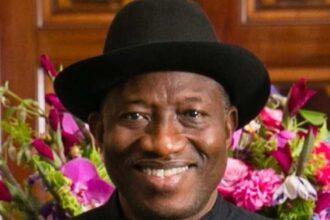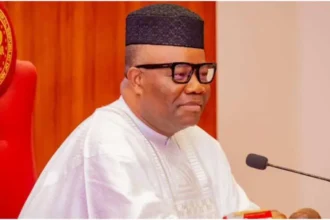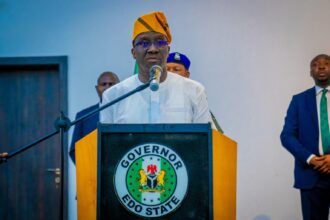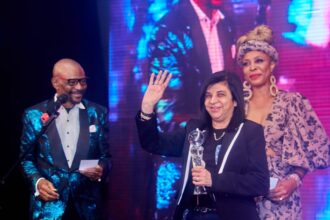...To get all news updates, Join our WhatsApp Group (Click Here)
Also Join our WhatsApp Channel (Click Here)
What do you think about President Muhammadu Buhari’s ministerial nominees so far and what input did you have in the selection process?
We all waited for President Buhari’s list to come out. We have seen it and we trust God for the best as regards these people he (Buhari) chose by himself after due consultation with the Vice President (Prof. Yemi Osinbajo) and the party (the All Progressives Congress). We trust that as some of them had performed well in time past (in areas) that we can point to, they would had the grace to also do extraordinarily well for the citizens of Nigeria.
As for whether I have an input or not, that question is uncalled for because I am not in the decision-making organ of the party. He (Buhari) said it publicly that it (the selection) was (made) after due consultations with the Vice President and the leadership of the party. I am neither the Vice President nor an officer of the party. So, the question of my input has no basis.
The names of several of the ministerial nominees had been bandied about for months, prior to the official announcement. Do you think the delay in releasing the list was warranted?
In the first instance, he explained why it took that long. I do not think that President Buhari had no idea of who he wanted in his cabinet; I believe he had an idea of who he wanted but he wanted to act democratically: One, by consulting with his people as well as the vital organs of the leadership of the party. Two, he did mention in his October 1 broadcast that it was just few days to May 29 that he received the handover notes, then, the transition committee they set up had the opportunity of some weeks to go look into the notes. Three, they then sat down to harmonise the ministries with a view to making them lean and mean so that we don’t have a bogus government. If you do not know what ministries you are going to have, what would be the basis for appointing ministers for such ministries, which you have not agreed upon? It was after they had done that that they began to fill the places; that was when he decided, ‘I think A can go to ‘A’ ministry, B can go to ‘B’ ministry and C can go to ‘C’ ministry.’ That is why he took that long. It is not that he had no idea of who he wanted in his cabinet. But he had to do it thoroughly. Slow and steady wins the race.
A number of the ministerial nominees, especially some ex-governors, have been singled out in petitions and allegations of corruption. Is there anyone on the list who you may have doubts about?
Nigeria is a very complex country to govern. I am a preacher; permit me to digress a little to bring some wisdom from the Bible. In Deuteronomy 1, while doing his handover notes, Moses, the servant of God and the leader of Israel who led them (the Israelites) out of Egypt to the Promised Land, said, ‘May the good Lord multiply you a thousand times more.’ In essence, population is no problem. You can look at China and India, population is no problem; it should actually be an asset. ‘May the Lord multiply you a thousand times more, but I cannot bear — (three things) — your complaints, your problems and your burdens.’ This is the primary task of government. My understanding of this is that complaints that are not looked into become problems, and the problems that are not solved become burdens.
It is legitimate for some people to have petitions and complaints about an individual, based on their knowledge of that individual. But if you look at the other side of the spectrum, there are people who are thanking God for that individual because they benefitted from him while in office. Therefore, I have no comments that I will make publicly about any individual. President Buhari and his leadership team must have spent quality time to look at those things (issues) and you can rest assured of one thing: he is law-abiding and, because he is law-abiding, he will do the needful if any of them is found guilty. Remember, an accused person is presumed innocent until the contrary is proved. So, allegations do not translate into the committal of a crime. They remain allegations. But the Senate has said it will look into those things and I pray that the best, brightest and fittest will come out of their screening so that Nigeria can move forward.
What is your general assessment of the list? Are you disappointed or otherwise?
To be honest with you, disappointment does not arise at all because I am in the ‘amen corner’ of Mr. President. I wish him well. I want him to succeed and I know he is a person of deep thought, who has put a lot of considerations into it. If the leader says, ‘This is the person I want,’ how am I going to be disappointed in that? Let me see the man who is so perfect that he does not have any faults here and there; even those who were used by God in the Bible. Once upon a time, Moses killed and God said, ‘Those who are looking for you are there.’ Once upon a time, Saul of Tarsus was murdering Christians and throwing them into jail. Remember the thief on the cross who said (to Jesus), ‘Remember me in your kingdom.’ He entered Paradise that same night. Let us not judge people only by their past. Let’s put the totality of the picture; let’s consider all. I do not think that President Buhari, who is a champion for order and who wants to fight corruption with everything God has given him, will condone corrupt people around himself. But until those things are proved, they remain in the realm of allegations. There is therefore no disappointment whatsoever. To be honest with you, I know at least five or six of them very well. The ones I don’t know, I give the benefit of the doubt.
Earlier this year, you said, “I trust Buhari and this is because I have worked closely with him but I doubt his environment.” What did you mean by “environment”?
That comment was made at the (Island) Club, where I gave a Lenten lecture. It was during that lecture that I said, ‘I can vouch for the integrity and honesty of Gen. Muhammadu Buhari (as he was then called). But I see some around him that I can’t say the same thing about.’ Remember, the APC is an amalgam of all kinds (of parties). But then, this is not heaven; this is the earth. In heaven, you may have angels attending to the duties in the throne room, but on earth, you still have men. And the best of men are still men, at their very best. Even in heaven, Satan — as Lucifer then — rebelled against God and created war, so how much more on earth? But I think likes attract likes. I believe in the power of influence more than the influence of power. If a leader is ramrod straight, he will influence his environment. And because of that, there can be a bandwagon effect of, ‘Look, this will displease the leader. Let’s do it right.’
That time was a time of politics, when there was still fight for this and that. In fact, I do not think that at the time I gave the lecture, we had gone to election. It was few weeks before the election. We have past that stage now. We are now face-to-face with the stark realities and I think the President put a lot of that into consideration before coming to his final list.
What lessons should President Buhari learn from former President Goodluck Jonathan’s failures?
To start with, President Buhari is not the new kid on the block. He had been governor of a total of six north-eastern states. He had been petroleum commissioner – what we now call minister of petroleum, and he had been Head of State for a brief period—between 1984 and 1985. He knew why he fought doggedly for those 12 years to unseat an entrenched regime or rather a political party (the Peoples Democratic Party) that had the vision or illusion of ruling Nigeria for 60 years. Whatever was his motivating factor should not be forgotten because what takes you to the top will sustain you at the top.
Now, there is what is called the PVC (Permanent Voter Card) revolution in Nigeria. He can’t afford to rest on his oars until his good becomes better and his better becomes best, because the promises made, and even those that are not made but are needful for this society, must be on the front burner for him to still stand before Nigerians and give account of his stewardship and expect them to vote for him or his party in the future. Those two things are enough to keep him going. And if he keeps on doing the right things, then the wrong things and the wrong people will leave him alone.
A number of big shots in the PDP have been jumping ship and pointing fingers at Jonathan for failing to fight corruption. Do you think that the party today would be what it is today if Jonathan had won the last election?
I will put it this way: failure is an orphan, success has many fathers. I’ve seen in this country that we are quick to shoot the wounded. If Jonathan did not accomplish much in the time he was president or vice president, I thank God for one thing: he did not allow a bloodbath in the process of handing over power. If he had decided to use all the powers at his disposal, he could still be unseated but there would have been bloodbath that was unnecessary and President Buhari alluded to that both in Washington—I was there with him when he made that statement—and here, when he received the baton in May. On October 1, he still alluded to it that he (Jonathan) saved Nigeria from an unnecessary bloodbath.
As for those who are talking, especially those he (Jonathan) looked up to as father figures; it’s too soon to abandon a person, no matter what he has done wrong or right. Let the law take the full effect if he has done anything that borders on crime. I am not supporting abuse of office, but please, ‘Do not rejoice over me, my enemy,’ as the Bible says, ‘because if I fall, I will rise again. The righteous man falls seven times; the Lord picks him up again.’ What am I saying? I am trying to say, ‘let’s give credit where it is due and let’s give correction that is necessary.’ We must not shoot the wounded because we are now teaching future people to sit tight because of the shame that will come as a result of handing over power.
The Minister of Petroleum Resources under Jonathan’s administration, Mrs. Diezani Alison-Madueke, is facing charges in the United Kingdom bordering on money laundering and bribery. What are your thoughts on accusations that she was high-handed during the last administration?
I was not part of that government. It stays in the realm of best guesses and I don’t do well with guesses. I like facts. The matter is in a court of competent jurisdiction outside of the realm of a ‘cash-and-carry’ legal system. So, let the law take its full effect. I do not think money can bribe a British judge. We have seen from (ex-Governor of Delta State, James) Ibori’s case that though he was discharged and acquitted on the same charges, he got to Europe and faced the music. If Diezani had abused power, that abuse must have been condoned by those who gave her free rein. So, you can’t blame Diezani alone; you (have to) look at the systemic failure that produced such people. Where is the place of checks and balances? Where is the oversight that the Senate was supposed to have in the National Assembly? Where is the collective effort of those in the cabinet? You can’t blame one man; the fall of one is the fall of all. It is a shame on the nation that they are arresting our ministers abroad and finding money in their hands. Like the people, like the priest.
What do you make of the pleas by Bishop Matthew Kukah of the Catholic Diocese of Sokoto; the President of the Christian Association of Nigeria, Pastor Ayo Oritsejafor, and others in the National Peace Committee against probing Jonathan?
He who wears the shoe knows where it pinches. The individuals you mentioned — the Bishop of Sokoto and Pastor Ayo Oritsejafor — they are people I can pick my phone (to call) and ask them about their opinion on what they have said. I have learnt not to follow what I read in the newspapers in Nigeria. My first daughter got married in August this year and it was all over that Pastor Bakare gave his daughter away (in marriage) in London, whereas it took place in Lagos. So, when they say things about people, I have learnt to be careful. And about what transpired between Bishop Kukah and President Muhammadu Buhari, until we get to hear from both sides, I am careful not to pass judgment.
I am not avoiding your question because it’s been done to me a number of times. In 1999, it was reported that I said (ex-President Olusegun) Obasanjo would die. I didn’t say such a thing. But where will I be going to say I didn’t say such a thing? I don’t waste my time. I just focus on what I am doing. If I gave a false prophecy, why did Obasanjo invite a thousand pastors to Ota to start praying for intervention? I just said, ‘Hey, be careful; if these take place, these are the consequences that will come.’ Nobody paid attention to the details of what I said that, ‘If by an act of omission or commission Obasanjo is sworn, in as President of Nigeria, three things would happen: One, corruption will reach its peak; two, the revival of the occult will claim the lives of many; and three, family life will disintegrate in Nigeria.’ Go back and check those things, whether they came to pass or not.
Here we are, I have no reason to hate Obasanjo, but it is what you blow into the flute that it brings out. I have heard claims that I said Obasanjo would die. Propaganda is the machinery of the wicked; they have a way of making a mountain out of a molehill. Why would anybody who believes in equity and fairness say that if someone has done evil, he should be overlooked? No! The Bible makes it clear that when judgment is not speedily executed, the hearts of men are set in them to do evil.
When I went to the US with the delegation of President Buhari, part of the little contribution I made during a meeting we had with (the first female US Secretary of State) Madeleine Albright was that we should learn from the past and we should not put the cart before the horse. In the past, what we were asking for was restitution— ‘return our money’ — but we didn’t do any prosecution. This time, we should prosecute and do it legally so that others will learn that there are consequences for what they have done. When you know that if you steal, you will face the music, you will think twice; except your father’s name means nothing to you and you are not a person of dignity and integrity. I don’t want to spend my life in jail over stolen wealth of the nation. No. But if for my conviction, for asking that Nigeria should be restructured, for asking for order and discipline to be in our nation, you jail me, then, I will become the moral conscience of the nation. I do not think any preacher in his right mind will say, ‘wherever you see wrong done, overlook it.’ I don’t think those people (peace committee members) will say so or else they know more than we know.
What if Jonathan is found to be guilty of looting the country’s treasury?
If he had looted the treasury, take the money back. Take the money back and let the world know; let the law take its full effect. A president is a servant of the people. Power is a trust from God. If he had looted the treasury, take the money back and let the law take its course. But don’t deliberately impugn his integrity; don’t give a dog a bad name in order to hang it.
Obasanjo has been meeting with President Buhari. Are you wary of his closeness to the President?
Buhari is not a young man that can be influenced by anyone. He knows his onions and his door is open to past leaders. And he must cross-check with them some things that are not clear to him. So, because people change, who knows? If a Saul could become Paul, if a Jacob could become Israel, who knows what an Obasanjo could become? He could become the person who says, ‘Oh my God! I regretted that I had the opportunity to do my best and I did not do quite well.’ If I had any pain where Obasanjo is concerned, it is not a pain born out of envy; we are poles apart age-wise, in terms of exposure and status. (In life) we are miles apart — he’s much older than I am. There is no competition at all. My pain is that I have not seen anyone as specially endowed and blessed in Nigerian history and political history like Obasanjo.
There is a portion of the Scripture in John 4, where Jesus met the woman at the well of Samaria and he said to his disciples afterwards, ‘Lift up your eyes and see, the harvesting field is white already and I am sending you to reap where you do not bestow labour.’ It is as if every time something major happens in Nigeria, he is the recipient of the blessings. Can you compare the role of Benjamin Adekunle of the Third Marine Commando Division in the Nigerian Civil War; can you put it on the same pedestal with the role of Obasanjo? Obasanjo joined them at the war front; not long after, he was the one that received the surrender note (from the Biafran troops). Obasanjo was not part of the coup that brought Gen. Murtala Muhammed into power but he became his deputy. And immediately Gen. Muhammed was murdered, he became the Head of State.
I remember him saying, ‘Against my personal wish and desire, the mantle of leadership has now fallen upon me.’ I mean, I heard his English and I said, ‘Oh my God, this is an Egba man speaking.’ But, he was our Head of State. Whether he was rough or rugged, take it or leave it, there is an invisible hand positioning him. Obasanjo handed over power whether out of being afraid or not, we don’t know. But he handed over power and he became a global power well received. Abdulsalam Abubakar was a parade commander the day Obasanjo handed over power to Shehu Shagari, only for Obasanjo, years after, – more than 20 years after – to come and receive power from the same Abubakar straight away from prison.
Those eight years (Obasanjo spent as president) should have been formidable years of putting Nigeria upon a pedestal that nobody can reverse it. And above all, whether it is insecurity or selfishness, which is the greatest curse on the face of the earth, he gave the weak and the sick to the nation. Whatever happened during Umar Yar’Adua and Goodluck Jonathan era – yes, they will have their own portion of the blame – but Obasanjo thought he could manipulate things from Ota. That is my opinion; that is my pain. He robbed this nation of quality leadership and he robbed this nation of being put on a pedestal of predictable progress. That should be his regret. Now, he should repent and contribute his quota towards giving quality leadership to this nation.
Are you saying Obasanjo messed up things during his eight years?
He did (mess things) big time; time will tell.
Some people are asking for immunity for some principal officers in the National Assembly. What do you think about this?
Immunity is the breeding ground of impunity. What I think should be enshrined in our Constitution, no matter the position you occupy, including that of the president, when it borders on crime is that immunity should not be something you feel you can cling to. Because immunity breeds impunity, no one should be above the law regardless of the office you occupy. In fact, in decent climes, such people should resume. But here, it is not so.
Will you, therefore, say that the immunity clause should be removed from the Constitution?
No. if you remove immunity clause, presidents and the governors can be overwhelmed by assailants –not those who just want to shoot them –but, those who want to bring petitions and false allegations against them all the time. But where a crime is proved, that someone has committed a crime, regardless of the office you occupy immunity should be taken away. That is why I said in decent climes –look at the Watergate scandal, Richard Nixon (a former president of the United States) resigned. Whenever crime is involved there should be no immunity –because immunity breeds impunity.
Some Nigerians are asking the Senate President, Dr. Bukola Saraki, to resign following the charges levelled against him by the Code of Conduct Bureau?
No. I am not saying that because they remain charges until he is proved guilty. But, if he knows in his heart of heart that he is guilty of those things, nobility will compel such a person to say, ‘Upon this consideration, I will remain on the floor of the Senate.’ But, if he knows that he is not guilty, let him wait there and let it be proved in the court. And if he is found guilty, even if he goes on an appeal or not, they will ban him from public life; it had happened before. History has a way of repeating itself.
You can get every of our news as soon as they drop on WhatsApp ...To get all news updates, Join our WhatsApp Group (Click Here)
Also Join our WhatsApp Channel (Click Here)









